

5 universal principles for Knowledge Management. There is no universal solution for Knowledge Management in an Organisation, but there is a set of universal principles.
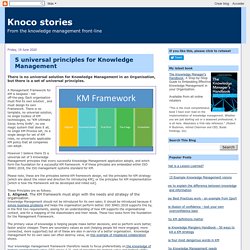
A Management Framework for KM is bespoke - not off-the-peg. Each organisation must find its own solution , and must design its own Framework. There is no template, no universal solution, no single toolbox of KM technologies, no "KM Ultimate Swiss Army Knife", no one magic system that does it all, no single KM Process set, no a single design for set of KM roles, no universally applicable KM policy that all companies can adopt. However I believe there IS a universal set of 5 Knowledge Management principles that every successful Knowledge Management application adopts, and which form the foundation for a successful KM framework. 4 of these principles are embedded within ISO 30401:2018, the ISO management systems standard for KM.
These Principles are as follows. 1. 2. The 4 legs on the Knowledge Management table. It's very easy to develop an unbalanced perspective on Knowledge Management, especially when we work closely with the topic, but it is something that we should strive to avoid.
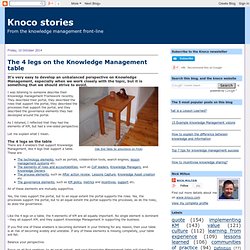
I was listening to someone describe their Knowledge management Framework recently. They described their portal, they described the roles that support the portal, they described the processes that support the portal, and they described the governance elements they had developed around the portal. As I listened, I reflected that they had the elements of KM, but had a one-sided perspective. Let me explain what I mean. The 4 legs on the table. Selective attention test. Forget The Wisdom of Crowds; Neurobiologists Reveal The Wisdom Of The Confident. Way back in 1906, the English polymath Francis Galton visited a country fair in which 800 people took part in a contest to guess the weight of a slaughtered ox.
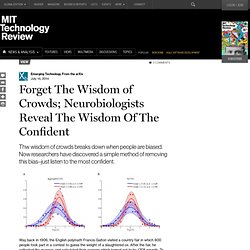
After the fair, he collected the guesses and calculated their average which turned out to be 1208 pounds. To Galton’s surprise, this was within 1 per cent of the true weight of 1198 pounds. Initial thinking on scaling. Cynefin: A suggestive framework for problem solving. Cynefin for Devs. Every now and then, someone comes up with a new way of looking at the world that becomes the next fashionable thing to do.
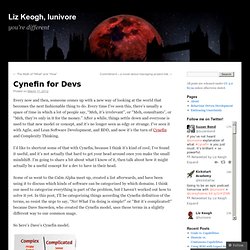
Every time I’ve seen this, there’s usually a space of time in which a lot of people say, “Meh, it’s irrelevant”, or “Meh, consultants”, or “Meh, they’re only in it for the money.” After a while, things settle down and everyone is used to that new model or concept, and it’s no longer seen as edgy or strange. I’ve seen it with Agile, and Lean Software Development, and BDD, and now it’s the turn of Cynefin and Complexity Thinking. Mark Harbor - I like these. 14 Things I’ve Learned About Content Curation In Social Media. We recently published a post called “50 Random Things I Have Learned About Social Media Marketing” that quickly became one of our most viewed posts of all time.

It was obvious that many people appreciate a clear and concise post that lists actionable items and truths about effective social media marketing. We decided to apply the same principle to a post about content curation. Content curation is something that has been written about quite extensively, however most people still don’t seem to understand what it is and how to be effective with it in social media.
In fact many brands even ignore the importance of curation in their streams and instead continually talk about themselves. Time for knowledge and wisdom. “I never have the time”.
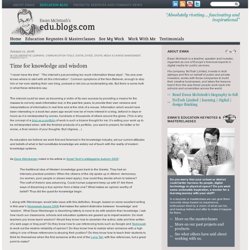
“The internet’s just providing too much information these days”. “No-one ever knows where to start with all this information”. Common symptoms of the Non-Believer, enough to stop him or her ever starting their own blog, podcast or del.icio.us bookmarking site. HenleyForum : Knowledge is created at... Peterthomson : In future knowledge management... Peterthomson : Tata run knowledge sharing... HenleyForum : Knowledge is about the flow... How do we transfer knowledge through everyday meeting talk? It's not too often I get the opportunity to help out someone who is doing some really fascinating research into Knowledge Management and conversation.
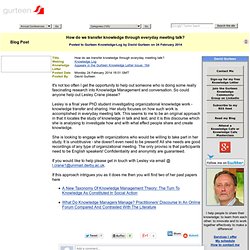
So could anyone help out Lesley Crane please? Lesley is a final year PhD student investigating organizational knowledge work - knowledge transfer and sharing. Her study focuses on how such work is accomplished in everyday meeting talk. Kurt Vonnegut Diagrams the Shape of All Stories in a Master’s Thesis Rejected by U. Chicago. “What has been my prettiest contribution to the culture?”
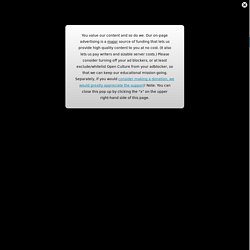
Asked Kurt Vonnegut in his autobiography Palm Sunday. His answer? His master’s thesis in anthropology for the University of Chicago, “which was rejected because it was so simple and looked like too much fun.” The elegant simplicity and playfulness of Vonnegut’s idea is exactly its enduring appeal.
Story colored glasses: The Confluence Sensemaking Framework. The Confluence Sensemaking Framework (CSF) is a tool your group can use to make sense of any situation in order to make decisions about it.
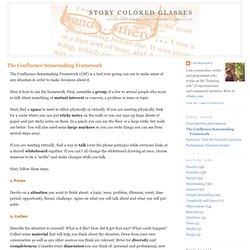
Here is how to use the framework. First, assemble a group of a few to several people who want to talk about something of mutual interest or concern, a problem or issue or topic. Next, find a space to meet in either physically or virtually. If you are meeting physically, look for a room where you can put sticky notes on the walls or you can tape up large sheets of paper and put sticky notes on them.
In a pinch you can use the floor or a large table, but walls are better. If you are meeting virtually, find a way to talk (over the phone perhaps) while everyone looks at a shared whiteboard together. Next, follow these steps. Your five first steps towards Knowledge Management success. Develop a draft Knowledge Management Framework.
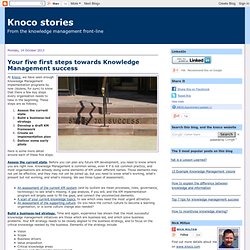
As Knowledge Management has evolved over the last two decades, the need for an integrated Knowledge Management framework has become apparent. With a Management Framework, KM can take on the aspects of other management systems, and be made part of normal business, rather than relying on a disparate set of tools. A Knowledge Management Framework ensures that all necessary KM elements (Accountabilities, Processes, Technologies and Governance) are in place, and interconnected.
This ensures that there are no gaps in the system, and that knowledge flows freely through the organisation. Your Assessment (Step 1) should have been planned with a Framework in mind, and will have identified the gaps which need to be filled. we are calling this a "draft framework" at the moment, as the framework will not be finalised until after piloting. 4 pages of wisdom: "How Complex Systems Fail" Roxanne Persaud (@commutiny) has shared an important paper in looking at mistakes and failure. It is "How Complex Systems Fail" (link - PDF) by Dr. Richard Cook, director of the Cognitive Technologies Laboratory at the University of Chicago. The 1998 paper is brief - only 4 pages long - and is in bullet form. Global Cool's - The Art of Conversation. Fossils, Time Capsules, Museums and other Knowledge Retention techniques. When Simplicity Is the Solution. The Verbs of Resilience – Andrew Zolli. In the course of conversation with leaders, practitioners and critics, I sometimes encounter a set of questions about resilience thinking that unfold along the following lines: Resilience (of the right things) seems self-evidently valuable, but is it more than a buzzword?
If so, how do we put it into practice? What exactly do we do for people, systems and organizations to help them become resilient? And how do we measure the progress of our efforts? These are trenchant questions. Institutionalising serendipity: Randomised Coffee Trials. Euan Semple on curating. The Magical Number Seven. Originally published in The Psychological Review, 1956, vol. 63, pp. 81-97 (reproduced here, with the author's permission, by Stephen Malinowski) Table of Contents My problem is that I have been persecuted by an integer.
For seven years this number has followed me around, has intruded in my most private data, and has assaulted me from the pages of our most public journals. Accuracy, resilience and denial. ... three ways to deal with the future. Accuracy is the most rewarding way to deal with what will happen tomorrow--if you predict correctly. Accuracy rewards those that put all their bets on one possible outcome. The thing is, accuracy requires either a significant investment of time and money, or inside information (or luck, but that's a different game entirely). Without a reason to believe that you've got better information than everyone else, it's hard to see how you can be confident that this is a smart bet. Resilience is the best strategy for those realistic enough to admit that they can't predict the future with more accuracy than others.
Dealing with the problems. The Daily Motivator - www.GreatDay.com Friday, September 13, 2013 The more you learn from your problems, the more effective you become at dealing with them. The more you learn from a problem, the less likely it is to trouble you again. When a difficult problem comes along it can be easy to feel sorry for yourself. Use PACMAN to beat information overload and fix filter failures! Deadly conformity is killing our creativity. Let's mess about more. I began to notice the creativity of the manager of the Pret a Manger coffee shop, close to where I live, after he showed extraordinary kindness to a woman with Down's syndrome in her 20s.
Two Years of Failure. The story of the checklist: Anecdote. Sometimes the simplest interventions can have the biggest impact. KM as market garden or wild garden? One of my favourite sayings is that if knowledge is organic, KM is gardening. And as all gardeners know, gardening is hard work! The Usefulness of Useless Knowledge. By Maria Popova. The 4 Functions and 12 Constructs that influence Knowledge Management. The best course I ever did, and 11 Top Tips for creative teaching.
Over the next few days we will be sharing the winning three stories in our Transition Training competition of courses people did that changed their lives. How To Win Any Argument. Where does knowledge come from? In most of the training courses I run, I ask the question "where does knowledge come from? " Dr. Bonnie Cheuk: Are we entering the age of superficial Enterprise 2.0 adoption?
I have been leading and driving the use of Enterprise 2.0 in a large complex bank in the past three years, and I have been watching closely how my peers are doing this in similar and different industries. Everything seems going well, the picture seems rosy. Survivorship Bias. Survivorship bias and noticing more. Three levels of Knowledge - Must, Should and Could. The Momentum of Knowledge Management.
Information literacy. Change Magazine - September-October 2010. How do we deal with unwilling corporate learners? Worldsview Academy for Organisational change. Understanding complexity - The Cynefin framework. Is this Knowledge Management’s most effective tool? Technical Writing and Storytelling — about work. Cutting the "cost of not knowing" Why Socrates hated explicit knowledge, and what to do about it.
Learning. The Knowledge Management strategy map. 7 signs that your KM strategy is in trouble. Knowledge Management - what's most commonly missing? Why great ideas don't always spread. Atul Gawande: How Do Good Ideas Spread? A simple way to embed your values with stories. How to measure Knowledge Management. Knowledge Sharing. What is Knowledge Management? - Judy Payne. Your five first steps towards Knowledge Management success. 10 Destructive KM Myths. Seven guiding principles for knowledge management in your organization. KM cannot be about tools in search of a problem. Why can't you sell Knowledge Management?